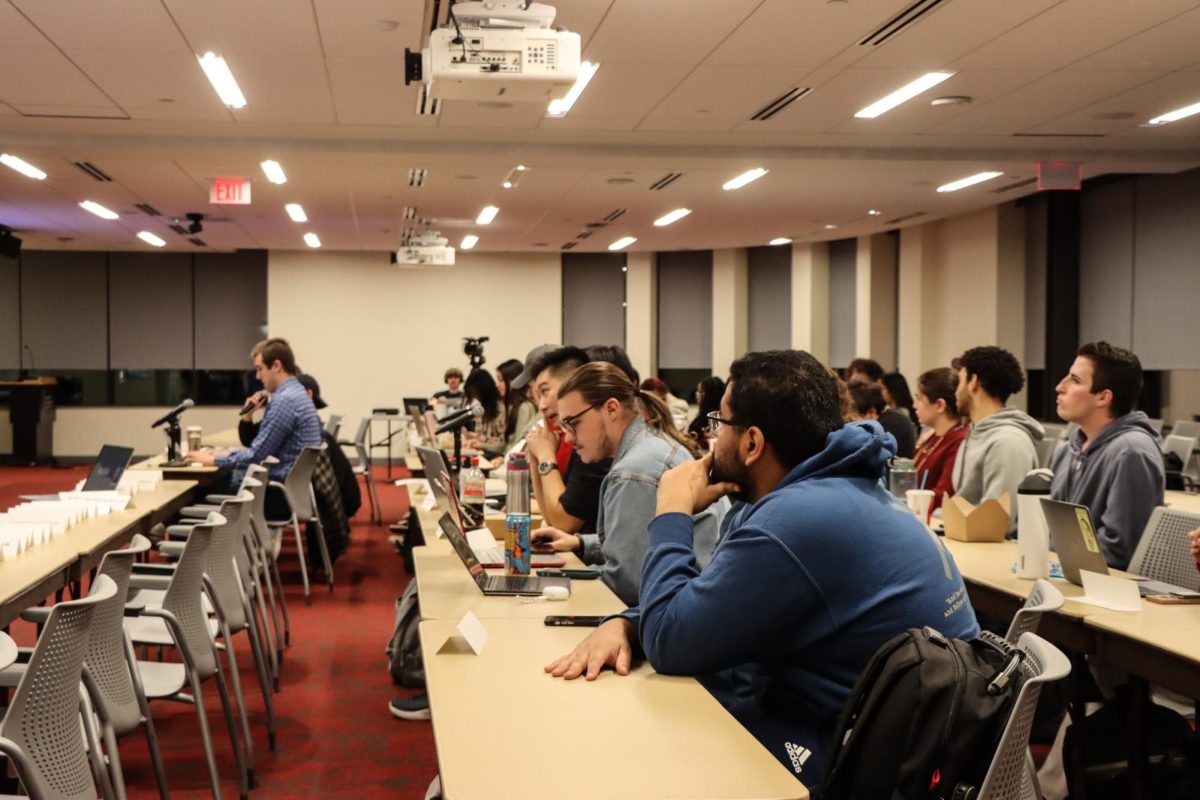
In its final meeting before winter break, apologies were given, taking time to consider was encouraged, and even laughs shared by the Student Government Association (SGA) on Wednesday.
The meeting commenced with President Brandon Tower explaining that the University of Massachusetts system is looking at about a potential but very likely $84 million shortage by the 2014 fiscal year. He implored the senators to ponder ways to cushion that deficit over winter break.
“Please stay attentive and be thinking about ways to raise more money,” Tower said.
Associate Speaker Tina Kennedy began the meeting with a speech about the great progress the body has achieved and how much the senators have grown as a group over the course of the semester. She also expressed her enthusiasm for next semester now that the senators have a better handle on policies and how to make decisions.
The floor was then turned to Mitch Fleishman, the current Sylvan area governor, who began his speech with an apologetic announcement that he would be resigning to take a job as a resident assistant in Southwest Residential Area. He also gave an update on the failures currently in Sylvan in regards to its lack of programming, the charter, and the area government. He concluded his speech with another apology and urged all area governors to look at their charters and begin revisions.
Secretary of Finance Ben Levine also apologized for the fact that he would not be returning next semester, due to his recent acceptance into an internship in Washington, D.C.
During senate reports, Orchard Hill senator Nick Barton announced that there would be two open Senate seats next semester; one representing North Apartments and one representing Northeast. The positions are available to anyone who lives in those two areas. In order to be considered, potential applicants must first be sponsored by a current senator and then submit the motion to the Administrative Affairs Committee for review.
Chair of Ways and Means Committee Josh Davidson updated the Senate with a finalized funding guide, which appeared to be extremely well received. Some of the highlights of the new guide include requirements that advisors sign off on budget requests and that the committee reserve the right to choose what should be funded for any given Registered Student Organization (RSO).
One of the most important aspects of the funding guide is that it will ask RSOs what their highest priorities are. In this way, should the SGA be forced to make cuts, they will be able to reduce funding accordingly.
Davidson followed up on the budget deficit, which President Tower had spoken about earlier in the meeting. He brought up the possibility of creating a task force to begin looking into records to figure out where money could be pulled from with minimal impact.
Student Trustee Mike Fox supported Tower’s and Davidson’s opinions on creating this task force, stating his belief that budget woes will only get worse over coming years.
“As the budget crisis becomes ever more prevalent it becomes more and more important for all the constituents on all the campuses to work together,” Fox said.
“[They can] find where their interests overlap in order to help advocate for the state and really show the Commonwealth the incredible resource they have in the University of Massachusetts,” he continued.
Fox also mentioned that he is starting talks with the student trustee from UMass Boston. Together, they hope to put together a collaborative five-campus dialogue to come up with new methods to reduce the impact of budget cuts.
Two motions that had been tabled at last week’s meeting were then put back up for discussion. The first motion was a proposal to create a vice president position, which had been tabled due to the extreme opposition and lack of confidence from the Residence Hall Association (RHA).
After brief debate, the motion was tabled once again, with the consensus that the issue would have to be further looked at.
Another motion that had previously been tabled was one sponsored by the Committee on Student and Academic Affairs to provide equal access to student health care, with particular emphasis on veterans. Secretary of University Policy Dave Robertson advocated the motion,
“These veterans give up so much to put their life on the line and they come back and are unable to receive quality health insurance,” he said. “Veterans should not be denied access to health care or given subpar health care.”
However, Robertson also suggested the possibility that University Health Services (UHS) had something to hide from the SGA, since UHS failed to give SGA any solid answers to queries for information. The main motion was called, and the motion to recommend that UHS will accept all forms of veterans’ insurance.
Senator Ben Johnson also sponsored a motion to allocate Finance Reserves funds to RSOs in order to stimulate growth. He cited the fact that the money is not currently being utilized and increased access to it could help foster growth among the student body. However, Johnson wished to withdraw the motion, stating that he feels as though there has not been enough conversation on it yet.
“[I hope to] talk with the Secretary of the Registry more to hammer out details to make it a more efficient policy to help the students,” he said.
“We are hoping to start rewarding groups that are approved for RSO status financially,” continued Johnson. “This will help them to advertise and get their name out there.”
Johnson also pledged the SGA’s support in helping RSOs grow and develop external relationships. In addition, Johnson said he hopes to start working on these policies at the beginning of next semester.
The SGA is set to reconvene on Jan. 19.
Ashley Berger can be reached at [email protected] and Cameron Ford can be reached at [email protected].












